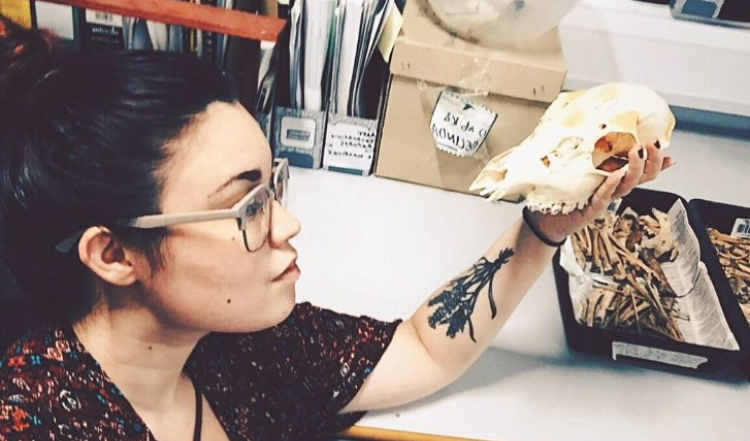
Wait, You Really Study Dead Animals?
This week we spoke with Alex Fitzpatrick, a researcher with a very unique job title: zooarchaeologist. This is defined as "the study of faunal remains, the items left behind when an animal dies." We were not familiar with this line of work before we spoke with Alex, so it was exciting to learn about this type of career.
Alex first discovered her interest in archaeology when she watched Indiana Jones as a child. She quickly became interested in being able to learn about past events through artifacts. After seeing the movie, Alex headed out to her backyard where she dug a huge hole while pretending to be an archaeologist. After her parents found out, she was scolded for ruining the yard. Alex responded by going to her friend’s house where she did the same thing. What her parents considered to be poor behavior, showed Alex’s early dedication to this career. Later, in high school, Alex chose to pursue archaeology in college because it perfectly combined her love for both history and cultural studies with the sciences.
Early in her career, Alex jumped between several different specializations within archaeology. During her undergraduate studies, she focused on classical archaeology which is Greek, Roman, and Egyptian. After this, she considered pursuing Arctic or Viking Age archaeology. Alex even transferred schools before pursuing her master’s degree because the programs at her undergraduate institution were focused around zooarchaeology and she did not think that was what she wanted to pursue. In the end, she realized that zooarchaeology was the perfect specialization for her master’s thesis because it allowed her to best integrate her passions for science and history. After choosing this, she has not looked back and is now pursuing her Ph.D. under this same specialization.
Alex’s research for her Ph.D. is studying animal bones from the Covesea Caves, off the north-east coast of Scotland. These caves, which include the Sculptor’s Cave, are thought to be part of a later prehistoric funerary complex due to the human remains found there. Alex's project, however, focuses on the animal bones from these caves and examines “what types of species are represented, how they’ve been treated and attempts to figure out what purpose they may have had in the context of the rest of the sites.”
When asked what inspired her Ph.D. studies, Alex excitedly explained that studying abroad as an undergraduate student really shaped her path. She was lucky enough to travel to Scotland for her first archaeological excavation. It was here, that she worked with University of Bradford students and was impressed by how much their studies were focused on the practical and scientific aspects of archaeology. As a result, Alex packed her bags and joined the University of Bradford for her graduate studies.
While moving from the U.S. education system to the U.K. system, Alex had to adapt to the fact that in the U.S, archaeology is treated as a branch of anthropology and is very theoretical. However, in the U.K, archaeology is treated more as a science and is very hands on. Alex has learned to really appreciate both approaches, which has given her an even better understanding of the field.
When not working on her Ph.D. project, Alex also runs a blog called “Animal Archaeology.” The blog shares a lot of great information from all areas of archaeology and the posts are written in an approachable way that makes reading the blog really enjoyable. Alex recently launched a new series on the blog, titled “Studies in Skyrim,” where she uses elements of the video game, Skyrim, to explain the real world archaeological counterparts. This series comes out of a newly formed discipline, called archaeogaming which has been growing in popularity among archaeologists. Check out Alex’s blog to keep up with this awesome series!
To end our conversation, Alex shared a piece of advice for other early career researchers saying; “it’s perfectly normal to occasionally feel behind your peers, to feel like you’re not doing your best, to just feel not great about your work in general. But remember that you’re not alone - everyone feels like that, everyone compares themselves to their peers.” She highlighted that it is important to remember that an academic career is not a race and that researchers should feel free to go at their own pace and be proud of their accomplishments. We love this advice because academia can put a lot of pressure on students and it is important to take time to reflect on the truly amazing work that is being accomplished.
At Conseris, we love hearing about the passions researchers like Alex have for their work. We are also happy to help researchers make their data collection efforts more efficient, so they have more time to dive into their projects. See how Conseris can help with your work, try a free 30- day trial today HERE.
